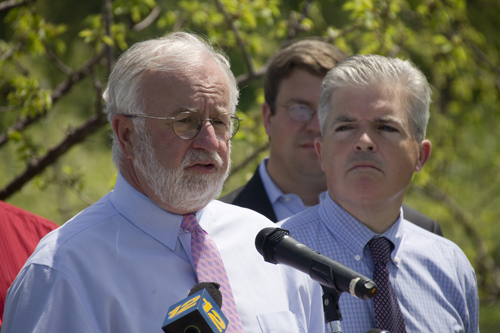Federal funds sought to help farmers protect bays, Sound

Turn the Peconic Estuary and Long Island Sound into a “critical conservation” area and free up federal funds for local farmers to protect water quality?
It’s a “no-brainer,” North Fork politicians say.
“We need this designation and I am confident … that we’re going to get this done,” said Congressman Tim Bishop (D-Southampton). “And when we do get this done, we will be able to give our farmers a set of tools that will help them do more of what they’re already doing.”
Mr. Bishop, Suffolk County Legislator Al Krupski (D-Cutchogue) and County Executive Steve Bellone urged the federal government to designate the Sound and the Peconic Estuary as one of eight protected areas in the nation at a press conference at Wickham’s Fruit Farm on Main Road in Cutchogue Monday afternoon.
The designation would come through the recently passed national farm bill, and would give East End farmers and state agencies a share of the roughly $1.3 billion over five years available. The newly established Regional Conservation Partnership Program would oversee the funding.
That money could be used to pay for conservation efforts, habitat restoration and the “best practices” farmers can use to reduce water pollution and pesticide use.
“This is one of the most beautiful areas of our country, but it is also one of the most vulnerable too,” Mr. Bellone said, calling the area the “perfect place” to be protected. “Agriculture is certainly one of the most important sectors of our economy. It’s part of our culture, our history, our quality of life here in this region.”
Mr. Bishop said that while the designation likely wouldn’t be decided for several months, the North Fork agriculture industry and representatives in government are getting a jumpstart on the process by lobbying for the funds now.
“We’re talking about two estuaries of national significance,” he said. “There are only 28 of them in the country,” Mr. Bishop said. “I don’t want to say this is a ‘no-brainer.’ I want the Secretary [of Agriculture] to make a considered judgment. But, Mr. Secretary, this is a no-brainer.”
The trio of politicians were joined by agriculture and environmental groups, who said the designation would help farmers transition into the “next level” of farming.
“Farming is essentially a business, and to be sustainable it means two things: You have to keep the land and the environment productive and you have to have family, new families coming along,” said Tom Wickham, a former Southold Town supervisor whose family has farmed in Cutchogue for generations.
Mr. Wickham said at the press conference that federal funds would be a boost for farmers old and new, and would provide stability and might encourage others to join the industry.
He pointed to protected land nearby, saying local funding spent to protect it helped support Mr. Wickham’s family, while also promoting preservation, he said.
Mr. Krupski said the money would allow farmers to continue their efforts to upgrade equipment and improve water quality.
But just as important, he said, would be the momentum gained if the designation stuck.
“You have to keep making it important to people in order to get the support to get things done,” Mr. Krupski said. “Out here it’s easy. In Southold, people really understand that. They appreciate it.
The further west you go, they have other priorities … This [designation] keeps it snowballing.”







